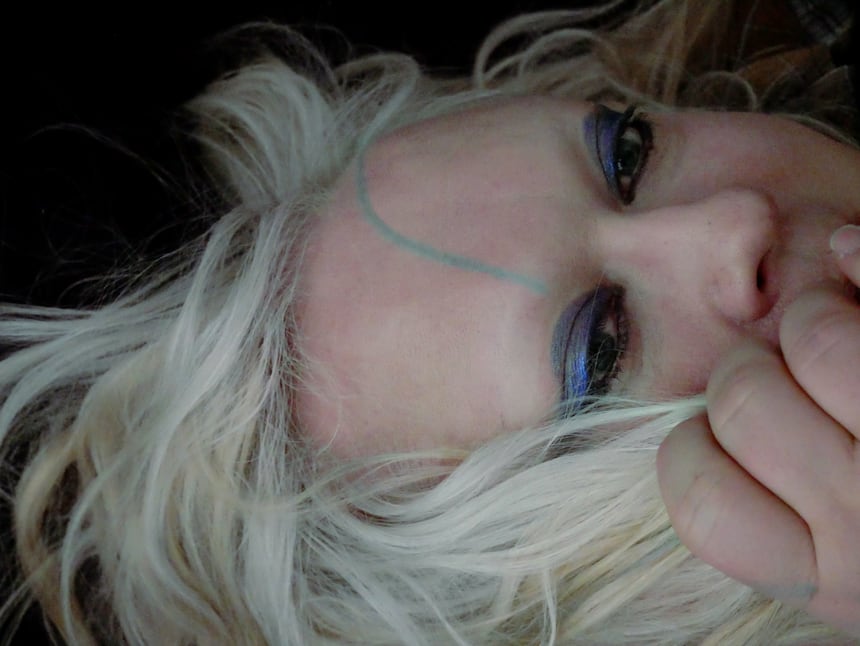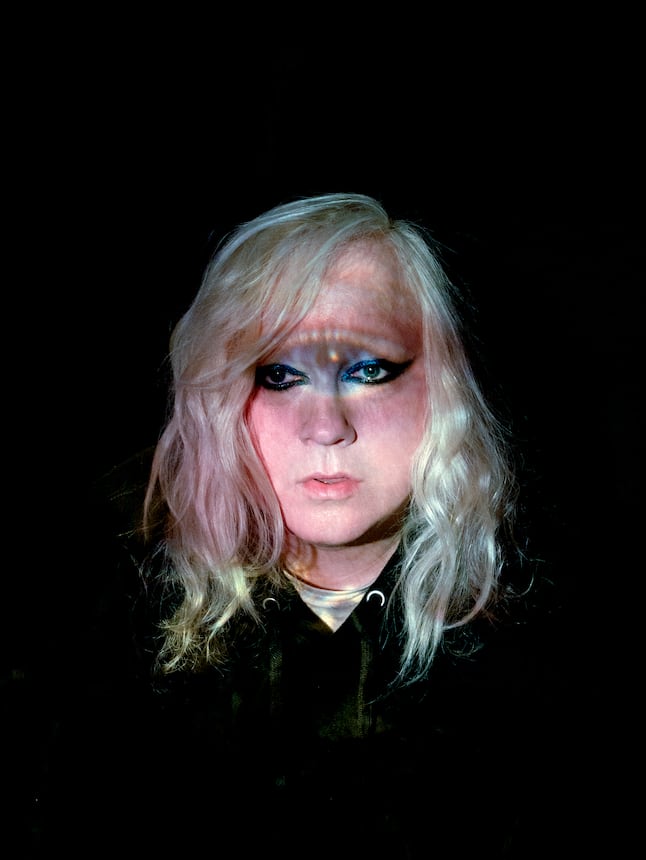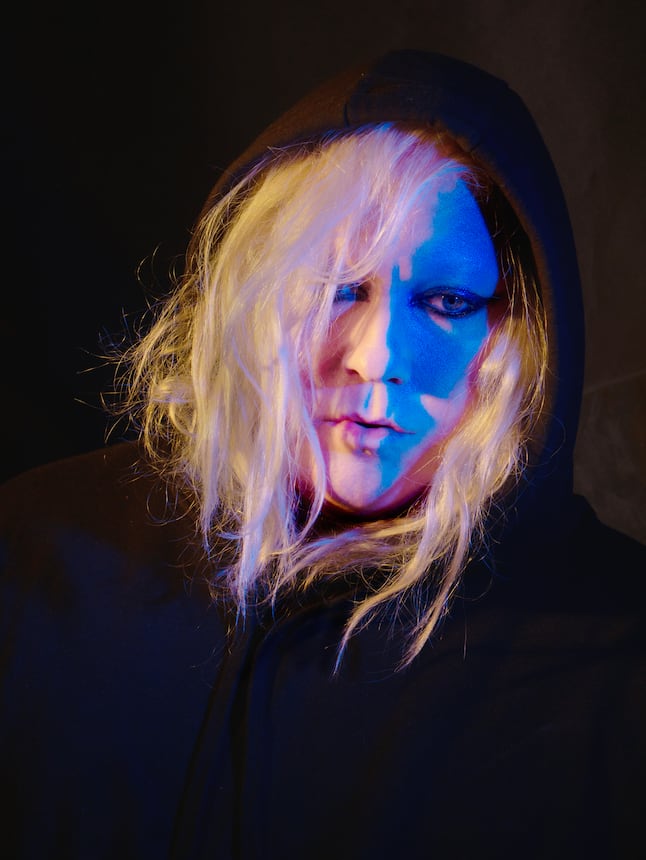What guides your creation the most?
Anohni: Colour, I love colour. And shape. You know, I love shape and color. Feeling and intuition.
What was the colour of this album then?
Oh, it’s like a bird. Baby blue like a robin bird’s egg.
Would you say we love music as we love colours, instantaneously and without any control?
I mean, it’s funny because some music really does grow on you, as you listen to it more than once. You know, some music immediately has a narcotic impact. But other songs you have to learn to love. I think of certain songs. I mean, haven’t you listened to a certain song and you didn’t like it? You couldn’t really understand it. But then after you listen to it five times you loved it.
How do you think we learn?
When the music wasn’t on streaming, it was very different because you would buy an album, and then you had already made a kind of commitment to it. And even if you didn’t like it the first time you would always listen a few times, because you’d already made a commitment to the music financially. You also wanted to understand what it was. You were much more likely to explore music that you wouldn’t have necessarily gravitated towards on the first listen. Because now with streaming, people only listen to what the ear already appreciates, like sugar, you know, because as soon as they stop hearing sugar, they turn it off. And they go to the next thing. But with the old way of listening to music, you would listen and learn, and then you would decide what you really thought, because it’s impossible to understand a song, most songs, by listening to it once, you know, especially if it has a poem embedded in it. And especially if the structure of the song is at all sophisticated. It’s like an artwork or a painting. Now people listen to music the same way that they look at an image, just like on Instagram, you know, but it’s just not the same kind of absorption.
These days, people only listen to what the ear already appreciates. Like sugar.
Presenting an album with its booklet and cover seems essential, yet in the streaming experience, it has become less significant.
It was very beautiful and very enriching as a child when you buy a record, because also the artwork was quite big. And so there were a lot of details, a lot of subtle things that you would learn about painting and writing. And oftentimes the artwork for an album was as important as the context for the listening experience. But rather than staring at a screen with a lot of advertising, you would be staring at a piece of artwork that an artist had made for you to consider, almost like a talisman for the music. So it really was like a secret box, it would fold open, and there would be so many details, many, many more details than you’d ever see on a digital platform. All of the romance and the delight of that experience has been downgraded so that different people can make money off of music. And they had to convince people to abandon that more. They had to convince people that the convenience of instant access was more meaningful than the depth of the experience itself. And they seem to have succeeded.

It’s also perceived as trashy to be on social media as an artist.
Socials are like living inside McDonald’s. Who wants to live inside the biggest corporation in the world? Yet all the artists, including myself, were forced like sheep to enter it. It’s degrading, honestly. Because I remember the artists that I admired when I was young, they’d never had to endure this kind of tap dance. Basically, musicians get paid now with advertising money, and in an earlier iteration of pop music, like the left end of the 20th century, artists were just paid directly by consumers. It was a much purer exchange. Now, it has been corrupted by the intention of the advertiser. For instance, I have environmental songs, but if you go on YouTube and try to watch them, many of the most environmental songs, they will try to attach an advertisement for a car or an oil company, because the car brand wants to have the pheromone of environmentalism attached to their product. And if I want to turn that off, then I forfeit any tiny income for that song you gave away for free. They don’t let you choose what brand they inject into your product. Whereas in the old days, people would buy the record, and the consumer could have a real relationship with the work that you’ve made, and then you could make a real decision about what conversation you’re trying to have. But there’s no way to have those conversations when they’re being curated by advertisers. That’s why it’s also fake news. A corporation seeks a musician, and then a middleman connects a corporation with a musician and stops the musician from being paid directly. It’s much harder for artists and citizens to have an independent ecosystem in which to process reality. In the live environment, you can still have a direct kind of call and response, but through the object of music, it’s very difficult.
Six years after Hopeless, My Back Was A Bridge For You To Cross arrived, out of the blue. When and how did it become a reality?
I started thinking about writing songs for other singers actually. I started imagining some songs from the voices of other people, whose voices I loved. I thought maybe I would do an album with other singers. And then on an impulse, I decided to try to work with a producer which I’ve never done before, like this. I asked my label if they knew anyone that was competent as a sole producer in the UK. And they led me to Jimmy Hogarth. This relationship has just been very productive for me. We just had a really good time in the studio and the album presented itself. We really recorded the album before I was even committed to releasing an album, I just wanted to see what would happen in the studio. After we finished it, it was clear that it was an album and that we were going to release it.
Was it a necessity?
I don’t know, I never thought of it that way. It’s never occurred to me that it was a necessity. But I think it was more of a privilege. My early music when I was in my early 20s, I would definitely have described it as a necessity, it was a compulsion. Whereas in more recent years, it’s kind of an occasional privilege that I have the opportunity to do it. Especially working with other musicians, these songs were all written with Jimmy which I’ve never really done before. In the past, when I needed to write a song, I had to do it all by myself. At least that’s what I thought and I would always author the song from start to finish. So going into a beautiful studio and sitting down with a professional songwriter like Jimmy and then bringing to him my world, my lyrics and ideas that I’ve been developing over the course of my life and my approach to melody, it was just a very profoundly privileged experience. It’s a joyful experience. And I rarely do it. So when I do it, it’s like a miracle. I always forget that it’s a possibility. You know, it seems hard to get there sometimes, but I just asked, and the doors opened. This time I was very lucky. So I felt so happy for the whole process. It was really the most joyful process I’ve ever had making a record.
Would you tell me how things went in the studio?
I love Jimmy. He’s just a wonderful kind of bedside manner. He’s a really good midwife. Very patient, non-judgmental, but he has a great sensibility. And so I just truly loved working with him. The only thing I was worried about when we were recording was that I would have to release it. That was the only thing that was making me nervous. I wasn’t sure I wanted to release music but in the end, I got used to the idea that it was a good idea, you know? So it all came together. It was a beautiful chemistry.
What’s Going On by Marvin Gaye was a big influence, wasn’t it?
I talked about Marvin Gaye being an important influence on the record as much because he created the first really cohesive, politically minded critique, as a record in What’s Going On? He went subject by subject, song by song, and created a constellation of issues represented in 10 songs, that collectively embodied a world view. And this was a sort of, I think, revolutionary way of thinking about making an album. That’s been a big inspiration to me. He was almost clairvoyant in his vision in 1971, about what would happen with the environment, and with so many other aspects of social and environmental justice, in the United States on that album, from half a century ago, and how almost every song on that album could be looked at in today’s light and understood to be the truth, and I think I wanted to honour that particular legacy of his or acknowledge it. There are a couple of songs on there that sort of attempt to kind of call out to that legacy of insight that Marvin Gaye offered us. The album that I am offered is a kind of reflection, it’s a process of reflecting and creative exploration in the studio. But it does contain, like, 10 years of my writing. So some of the lyric content has been considered over several years. So it does include a kind of a world view from as far as the lyric contents are concerned. But it’s not as well structured as something like What’s Going On, which is very pure. This record is a mixture of the personal and political and hopefully, oftentimes, both simultaneously, but there, it reaches deeper into introspection.
You seem to give yourself entirely to heal others.
It’s a privilege to be able to do it in a way where it’s received in a dignified way. I think the cost comes when you’re treated without dignity as an artist, which is an unfortunate part of the transaction at times. But when people are gracious about it, and patient with the work and treat me with dignity, then I feel tremendously honored to have the forum, to be a part of cultural expression. I really do. I feel like I’m a part of the voice, the conversation, which is a dream, to be considered. The world would decide that I shouldn’t be some part of the conversation about what’s really happening, and that for me, is me doing the best I can, me fulfilling my maximum usefulness. And I want to be useful. I have these certain skill sets that I learned about singing and all the rest of it. But honestly, I think a lot about the world. The music is imbued with a lot of my kind of very intuitive thinking about the world and nature and existence. If it’s meaningful to people or if it inspires people in some way or helps them then that brings me a great sense of reward.


Do artists necessarily have a role to play?
It’s just like anyone, everyone who works hopes that they’re going to be useful to the community. Whether you make shoes or you make nice apples or you sell clothes, all of us want to be helpful to our community. We’re social creatures. Artists are the same, we just want to be helpful to our community. We want to help. Everyone has the same basic intention when we enter society. We don’t want to be separated. We want each person to find their special seat and be treasured for the specific gifts they have to offer: whether that’s insight or skill or mathematics or careful planning or benevolence or discretion… You know, there’s so many different values. My value was always, as a trans kid, to have a my spirit made of colour and light and sounds. I’m a dancing child, so that’s what we do. It’s the nature of a child like me that we would have something more creative, more expressive and colourful. That’s what I’ve devoted my life to doing, because that’s what’s natural to me.
If artists are just like everyone, why do we put them above everyone else?
I think it’s a part of culture. It’s a part of the cultural conversation. The songs all come from ancient times. This fantasy… This 20th century, 19th century fantasy that this is all original artwork is not really true. All of these songs are all songs that have been in our bodies since the beginning of sound. All the thoughts… It’s like an arrangement. People arranging dreams for the collective, for the community. But I do not think it’s more important than any other job.
What’s a question that has never been asked of you but that you’ve always wished to answer?
I don’t have a question like that. There’s no question. Because honestly, the music is what I actually have to offer. The music is my best answer. It’s my best gesture. Nothing I could say is going to be truer than what I put forward in the music, and I only try to create justifications for it when I talk, but it has its own frequency. Although I want to make a feminine world, I want to imagine an all feminine world… that would be my one dream. If we could ask everyone to imagine a world where all the governments became feminine in an effort to save what remains of nature, that would be my dream. That’s what I hope for every night before I go to sleep; I pray that this will happen. That women will finally take control of their families and their communities and insist on feminine values. That’s my one dream. And as a trans fem, I feel beholden to that vision and my job is just to support it.




